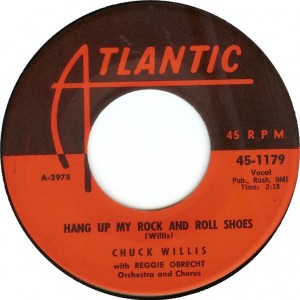
 My intention was to write about Chuck Willis this week, with a nod to Levon Helm who, as a member of The Band, covered one of Willis’ best known songs. I figured I would devote a paragraph or two to Levon, and then get on with it. The next thing I knew, one paragraph followed another, until I had almost a thousand words about Levon and I decided that both Levon and Chuck deserved their own tributes. You can read my Levon Helm appreciation here.
My intention was to write about Chuck Willis this week, with a nod to Levon Helm who, as a member of The Band, covered one of Willis’ best known songs. I figured I would devote a paragraph or two to Levon, and then get on with it. The next thing I knew, one paragraph followed another, until I had almost a thousand words about Levon and I decided that both Levon and Chuck deserved their own tributes. You can read my Levon Helm appreciation here.
Chuck Willis was an early hero of rock and roll. He was born in Atlanta, and signed to Columbia Records in 1951. After one single, Columbia shifted him to their Okeh subsidiary, where he established a fine reputation as an outstanding rhythm and blues singer and songwriter.
Five years later, Willis moved to Atlantic Records and had instant chart success with records like “It’s Too Late (She’s Gone),” and “Love Me Cherry.” His biggest hit for the label to that point came in 1957 with “C.C. Rider,” which not only reached the top of the R&B chart, but crossed over to success on the pop chart as well. The song’s lilting rhythm led to the establishment of a popular dance step called “The Stroll.”
Willis followed up with a more “stroll” hits, including “Betty and Dupree,” and the Fats Domino-written “Going To the River,” which made it to #4 on the R&B chart.
The great singer was at the top of his chosen profession, but his health wasn’t good. He suffered from ulcers, and in 1958 he got peritonitis, and died during surgery. His final single had been released just before his death, and it became a two-sided hit. The A-side, “What Am I Living For,” sold a million copies, earned a gold record, and was named R&B record of the year in 1958.
The B-side, “Hang Up My Rock and Roll Shoes”, was no slouch either. Atlantic single 1179 climbed the R&B chart to #9, and crossed over to the pop chart at #24. The song was famously covered by The Band for their live Rock of Ages album with an instantly identifiable lead vocal by Levon Helm.
Chuck Willis could do it all. He was a powerful blues shouter, but he also had a way with a soul ballad. The turban that he typically sported made him instantly recognizable. The title of his final single may be seen as an omen, but it was the joyous B-side of that single that I would rather remember him for. Unlike many other artists who struggled on for years after their peaks, Willis finished on top, but far too soon.
[youtube id=”supLwMGxFT4″ width=”600″ height=”350″]




Comments